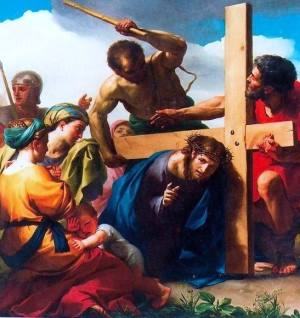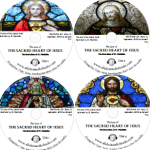The Love of Jesus Christ : Part 7
Download MP3 of The Love Shown to Us By Jesus Christ in His Passion Part 7: The Hope that We Have in Jesus Christ that He will pardon our sins. (Right Click and Select Save As)
Click To Download the Entire Catholic Audiobook : The Love Shown to us by Jesus in his Passion.
Transcript
And first, in speaking of the pardon of sins, we must remember that for this very end our Redeemer came upon earth, that he might pardon sinners: The Son of Man came to save that which was lost. Therefore the Baptist, when he showed to the Jews that their Messiah was already come, said, Behold the Lamb of God, that taketh away the sin of the world: As it was foretold by Isaias, As a sheep before her shearers, He shall be dumb; and also by Jeremias, I am as a lamb that is carried to be a victim? And first, he was foreshadowed by Moses in the paschal lamb, and by the sacrifice of a lamb to God under the law every morning, and by other evening sacrifices. All these lambs, however, could not take away a single sin; they served only to represent the sacrifice of the divine Lamb Jesus Christ, who with his blood would wash our souls, and thus free them both from the stain of sin and from the eternal punishment of sin, for this is implied by the words take away; taking upon himself the duty of satisfying the divine justice for us by his death, according to what Isaias wrote, The Lord hath laid upon Him the iniquity of us all. Wherefore St. Cyril writes, “One is slain for all, and the whole human race is restored to God the Father.” By dying, Jesus desired to regain for God all mankind who were lost.
Oh, how great is the debt we owe to Jesus Christ! If a criminal condemned to death were already standing at the gibbet with the rope around his neck, and a friend were to come and take the rope, and bind it round himself, and die in place of the guilty man, how great would be his obligation to love him! This is what Jesus Christ has done; He has been willing to die on the cross to deliver us from eternal death.
Jesus bore our sins, says St. Peter, in His body on the tree, that, being dead to sin, we might live to justice; by whose stripes we were healed. ” What can be more wonderful,” cries St. Bonaventura, ” than that wounds should heal, and death give life?” St. Paul says that God has graced us in his beloved Son, in whom we bare redemption through His blood, (ie remission of sins) according to the riches of His grace, which have super abounded in us , And this resulted from the covenant made by Jesus Christ with his divine Father, that he would pardon us our offences, and receive us into his favor for the sake of the Passion and death of his Son.
And in this sense the Apostle called Jesus Christ the mediator of the New Testament. In the Holy Scriptures the word Testament has two senses; that of a covenant, or an agreement between two parties formerly disagreed; and that of a promise, or disposition by will, by which the testator leaves an inheritance to his heirs; and this testament is not valid until the testator’s death. We have formerly spoken of the Testament as a promise; we now speak of it as a covenant, in the sense in which the Apostle uses it when he calls Jesus Christ the Mediator of the New Testament.
Man, by reason of his sin, was a debtor to the divine justice, and an enemy of God; the Son of God came on earth and took man’s flesh; and thus, being God and man, he became a mediator between God and man, acting on behalf of both; and in order that he might bring about peace between them, and obtain for man the divine grace, he offered himself to pay with his blood and his death the debt due by man. This was the reconciliation prefigured in the Old Testament by all the sacrifices and symbols ordained by God, such as the tabernacle, the altar, the veil, the candlestick, the censer, the ark, wherein were contained the rod and the tables of the law. All these tilings were signs and figures of the promised redemption; and because this redemption was to be accomplished by the blood of Jesus Christ, therefore God appointed that all the sacrifices should be offered with the pouring-forth of the blood of the animals (which was a figure of the blood of the Lamb of God), while all the instruments above named were sprinkled with the blood: Wherefore, not even the Old Testament was dedicated without blood.
St. Paul says that the first Testament — that is, the first alliance, covenant, or mediation — which was accomplished by the old law, and which prefigured the mediation of Jesus Christ under the old law, was celebrated with the blood of goats and calves; and that with this blood were sprinkled the book, the people, the tabernacle, and all the sacred vessels: When the commandment of the law of Moses was read to all the people, the priest taking the blood of calves and goats with water and with scarlet wool (the scarlet wool signified Jesus Christ, for as wool is by nature white, and becomes red by being dyed, thus Jesus, who was white by nature and innocence, appeared on the cross all red with blood, being condemned as a malefactor, and thus fulfilled in himself the words of the Spouse in the Canticles, My beloved is white and is ruddy) and ‘with hyssop (a lowly herb, which expressed the humility of Jesus Christ), sprinkled both the book and all the people, saying, This is the blood of the covenant, which God has commanded; and in like manner he sprinkled the tabernacle and all the vessels of ministration with blood. For all things are purged with blood according to the law, and without shedding of blood there is no remission.” The Apostle repeats the word blood several times, in order to fix in the hearts of the Jews, and of all men, that without the blood of Jesus Christ we have no hope of pardon for our sins. As, then, in the old law, by the blood of the victims the outward defilement of sin was taken away, and the temporal punishment due to them was remitted; so, in the new law, the blood of Jesus Christ washes away the inward stain of sin, according to St. John’s words, He loved us, and washed us with His own blood?
St. Paul thus explains the whole truth in the same chapter of the Epistle to the Hebrews. Christ being a High Priest of coming good things, by a greater and more perfect tabernacle, not made with hands, that is, not of this creation, neither by the blood of goats, but by His own blood,
entered once into the Holies, having obtained eternal redemption The high-priest entered by the tabernacle into the Holy of Holies, and, by sprinkling the blood of animals, purged sinners from their outward defilement and from temporal punishment; for in order to the pardon of the sin and for their liberation from eternal punishment, contrition, faith, and hope in the coming Messiah, who was about to die to obtain pardon for them, were absolutely necessary for the Jews. Jesus Christ, on the other hand by means of his own body (which was the greater and more perfect tabernacle spoken of by the Apostle), which was sacrificed on the cross, entered into the Holy of Holies of heaven, which was closed to us, and opened it to us by means of this redemption.
Therefore St. Paul, in order to encourage us to hope for the pardon of all our sins, by trusting in the blood of Jesus Christ, goes on to say: “the blood of goals and bulls, and the ashes of a heifer, sprinkled on the urn lean sanctifies to the purification of the flesh, how much shall the blood of Christ, who, by the Holy Spirit, offered Himself without stain to God, purify our conscience from dead works to serve the living God:” This he says because Jesus offered himself to God without shadow of sin, for otherwise he would not have been a worthy mediator, fit to reconcile God with sinful man, nor would his blood have had virtue to purge our consciences from dead works- that is, from sins, from the works without merit, and deserving of eternal punishment, to serve the living God. God pardons us for no other end than that for the rest of our life we should devote it wholly to loving and serving him.
Finally, the Apostle concludes. Therefore He is the mediator of the new covenant. Because our Redeemer, through the boundless love he bore us, was willing by the price of his blood, to deliver us from eternal death, therefore he obtained, for us from God pardon, grace, and eternal blessedness, if we are faithful to love him until death. This was the mediation or covenant accomplished between Jesus Christ and God, by the terms of which pardon and salvation are promised us.
This promise of pardon for our sins by the blood of Jesus Christ was confirmed to us by Jesus himself the day before his death, when, leaving to us the sacrament of the Eucharist, he said, This is My blood of the new covenant, which shall be poured forth for many for the remission of sins. He says, poured forth, because in the sacrifice which was at hand he was about to shed not only a part, but the whole of his blood, to satisfy for our sins, and obtain pardon for us. Therefore he desired that the sacrifice should be renewed every day at every Mass that is celebrated, in order that his blood might continually plead in our favor. And therefore he is called a priest after the order of Melchisedech: “Thou art a priest forever after the order of Melchisedech.” Aaron offered sacrifices of animals, but Melchisedech offered bread and wine, which was a figure of the sacrifice of the altar, in which our Saviour, under the species of bread and wine, offered at his last supper his body and blood to God, as he was about to sacrifice it on the following day in his Passion; and which he constantly offers by the hands of his priests, renewing by them the sacrifice of the cross. Therefore David called Jesus Christ an eternal priest, as St. Paul explains it, saying, He that remaineth for ever hath an eternal priesthood. The ancient priests came to an end by their death, but Jesus, being eternal, has an eternal priesthood. But how does he exercise his priesthood in heaven ? The Apostle explains this, adding, Wherefore he is able to save forever those who come to God by Him, ever living to intercede for us? The great sacrifice of the cross, represented still in that of the altar, has power forever to save those who, by means of Jesus Christ (being rightly prepared by faith and good works), approach to God; and this sacrifice, as St. Ambrose and St. Augustine write, Jesus, as man, continues to offer to the Father for our benefit, performing there, as he did on earth, the office of our advocate and mediator, and also of our priest, which is to intercede for us.
St. John Chrysostom says that the wounds of Jesus Christ are so many mouths, which continually implore from God pardon for us sinners. Oh, how much better, says St. Paul, does the blood of Jesus Christ plead for us in calling down the divine mercy than the blood of Abel, 4 which called for vengeance against Cain! In the revelations of St. Mary Magdalene of Pazzi it is recorded that one day God spoke to her as follows : “My justice is changed into mercy through the vengeance that was taken upon the innocent flesh of Jesus Christ. The blood of my Son does not call for vengeance like the blood of Abel, but for mercy only, and at this voice my justice is necessarily appeased. The blood binds my hands, so that they cannot move to take that revenge upon sins which they would otherwise have taken.”
St. Augustine writes that God has promised us the remission of our sins and eternal life, but he has done more than he promised. To give us pardon and paradise cost Jesus Christ nothing, but to redeem us cost him his blood and his life. The Apostle St. John exhorts us to flee from sin; and, in order that we may not despair of pardon for the sins we have committed, if we have a firm resolution not to commit them again, he gives us courage to hope for pardon, saying that we have to do with Jesus Christ, who not only died to pardon us, but, since his death, is become our advocate with the divine Father. To our sins were due disgrace with God and eternal damnation; but the Passion of our Savior has acquired for us grace and eternal salvation ; and justice itself requires this, since, on account of his merits, the Eternal Father has promised to pardon and save us. if we are only disposed to receive his grace and to obey his commands, as St. Paul writes, Being made perfect, He is the cause of eternal salvation to all that obey Him. Where- fore the Apostle exhorts us to run with patience the race that is before us, looking to Jesus, the author and finisher of faith; who, for the sake of the joy that was before him, endured the cross”, and despised shame.
O precious blood ! Thou art my hope. O blood of the innocent one ! wash the stains of the guilty. O my Jesus ! my foes having betrayed me into offending Thee, now tell me that I have no more hope of salvation in Thee; many say unto my soul, There is no salvation for him in his God.” But I trust in Thy blood that Thou hast shed for me. I will say with David, Thou, O Lord, wilt lift me up. My foes terrify me, and say that if I go to Thee, after so many sins. Thou wilt drive me from Thee ; but I read in St. John Thy promise, that him who cometh to Thee, Thou wilt not cast out. To Thee, therefore, I come, full of confidence. We pray Thee, help Thy servants, whom Thou hast redeemed with Thy precious blood. 5 Thou, O my Saviour, who hast poured forth all Thy blood in such agonies, and with such love, that Thou mightest not see me perish, do Thou have mercy on me, pardon me, and save me.
Resources
Saint Alphonsus Ligouri, The Passion and Death of Jesus Christ, Benziger Brothers, 1887, pg 345-353
Image Taken From the Public Domain
You may also like:
- The Love Shown to us by Jesus Christ in his Passion: Part 6 Jesus Crucified is our only Hope in all our wants.
- The Love Shown to us by Jesus Christ in his Passion: Part 5 What it is to live and die for Jesus?
- The Love Shown to us by Jesus Christ in his Passion: Part 4 Jesus died for us; we ought to live and die for Him.
- The Love Shown to us by Jesus Christ in his Passion: Part 3 Jesus died not only for us all, but for each one of us.
- The Love Shown to us by Jesus Christ in his Passion: Part 2 The Son of God Offered Himself for the Love of Us
- The Love Shown to us by Jesus Christ in his Passion: Part I God so loved men, that He gave His own Son to redeem them.
- Catholic Audiobook : The Love Shown to us by Jesus in his Passion.







